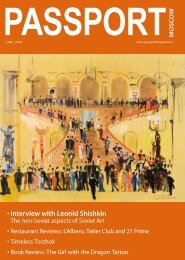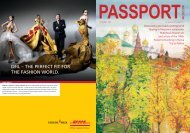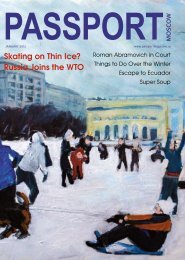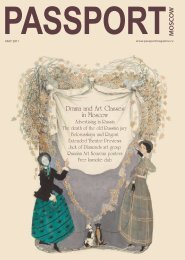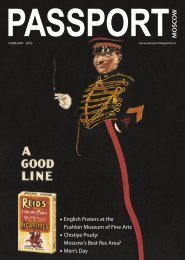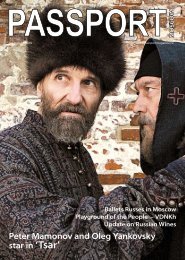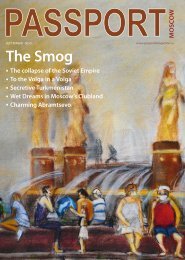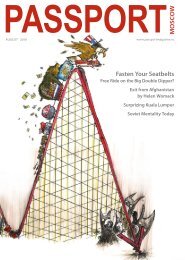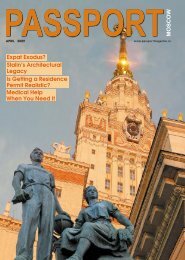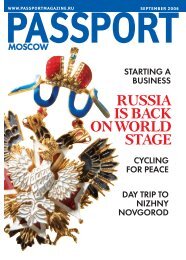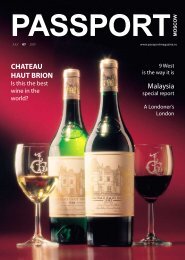A Truly Significant Holiday - Passport magazine
A Truly Significant Holiday - Passport magazine
A Truly Significant Holiday - Passport magazine
You also want an ePaper? Increase the reach of your titles
YUMPU automatically turns print PDFs into web optimized ePapers that Google loves.
The Bolshoi Theater is without doubt<br />
the most famous stage in Russia. It is<br />
especially popular among the expat<br />
community for the incredible opera and<br />
ballet performed there. Its user-friendly website<br />
with an English option (www.bolshoi.ru/en/) will<br />
provide you with its current repertoire. You can buy<br />
tickets online.<br />
Among popular repertoires at the Bolshoi are the opera Tosca,<br />
the ballets Giselle, Don Quixote and Spartacus. I was particularly<br />
impressed by the Bolshoi production of Musorgsky’s “Boris Godunov.”<br />
It is an incredible 5-act production consisting of nine scenes. The opera<br />
runs for 3 hours and 40 minutes but you don’t notice the time due<br />
to the intensity of the plot and the mastery of the actors. Currently<br />
the main building of the Bolshoi Theater is closed for renovation and<br />
productions are performed on the New Stage located on the left as<br />
you look at main building.<br />
Next to the Bolshoi is the State Academic Malyi Theater. There is a<br />
monument to the well-known Russian play-writer, Alexander Ostrovsky<br />
next to the main entrance. Ostrovsky wrote 48 plays and all of<br />
them were staged at this theater at some point. This is one the oldest<br />
Russian theaters, and was founded by the Russian Emperess, Elizaveta<br />
in the 18th century. This was originally called the Emperor Theater<br />
and its company consisted of Moscow State University students. In<br />
1824 it was housed in its own separate building.<br />
The Chisti Prudi area is a home for the Sovremennik Theater. Its<br />
artistic director, Galina Volchek, is a famous actress and director. The<br />
theater was founded in 1956 by another famous Russian actor and<br />
director Oleg Efremov. After Efremov left to manage the Moscow<br />
Chekhov Art Theater, Volchek took over at Sovremennik.<br />
Sovremennik was the first Russian theater which was invited<br />
on a tour to Broadway in 1996 with its masterpieces – Chekhov’s<br />
“Cherry Orchard” and “Three Sisters” and a modern play by Evgeniy<br />
Ginzburg: “The Steep Route.” Sovremennik received the American<br />
National Theater Prize “Drama Desk Award.” It was the first time that<br />
this coveted US prize was awarded to a foreign theater.<br />
The current repertoire is diverse. You can see plays by Chekhov<br />
and Griboedov along with Tennessee Williams and Bernard Shaw.<br />
The latest innovation was to invite four young directors, let them<br />
stage their first plays and invite the public in to judge them. Tickets<br />
can be bought: on-line at: www.sovremennik.ru , directly from the<br />
theater box office or by phone or e-mail.<br />
The Chekhov Moscow Art Theater is on Kamergerski Pereulok. This is<br />
one of the oldest theaters in Russia and is well-known internationally.<br />
The theatre’s founders – Konstantin Stanislavky and Vladmir Nemirovich-Danchenko<br />
– are exceptional figures in the history of theatre.<br />
The famous “Stanislavky System” – the actor’s system of working on<br />
his/her role quickly became popular internationally. The theatre’s<br />
existence began with a meeting of Stanislavky and Nemirovich-<br />
Danchenko at the “Slaviansky Bazaar” restaurant on June 19th, 1897.<br />
The theatre was opened on October 14, 1898 with the play “Tsar Fedor<br />
Ioanovich” in the “Hermitage” theatre building (Karetny Ryad, 3).<br />
From 1902, the theatre has been located on Kamergersky Pereulok in<br />
a building reconstructed the same year by architect Fedor Shekhtel.<br />
The real rise of the theater is tied up with Anton Chekhov’s drama<br />
(“The Seagull,” 1898; “Uncle Vanya,” 1899; “Three Sisters,” 1901; “The<br />
Cherry Orchard,” 1904) and with Maxim Gorky (“The Petty Bourgeoisie”<br />
and “Lower Depths,” 1902). The theater was in a real artistic crisis<br />
in the 1970s until Oleg Efremov took over as its new Artistic Director<br />
Theatre<br />
and breathed a new life into the theater. After Efremov’s<br />
death in 2,000, Oleg Tabakov became the Artistic Director. He<br />
began with renewing the repertoire (by staging classics such<br />
as “Hamlet,” “The Cherry Orchard,” “The Golovev’s,” “The White<br />
Guard,” “King Lear,” and “Tartuffe” as well as modern patriotic and<br />
world literature). Several outstanding actors were invited to join the<br />
troupe – Olga Yakovleva, Avangard Leontiev, Konstantin Khabensky,<br />
and others. Some of the most creative forces in modern directing<br />
were drawn to direct the shows — Sergei Zhenovach, Kirill Serebrennikov,<br />
Timur Chkheidze. The theater web-site will tell you more about<br />
itself even in English - www.mxat.ru/english .<br />
Oleg Tabakov is one of the most capable people in Russian<br />
theatre. He runs not only the Moscow Chekhov’s Art Theater but also<br />
a theater called Theater-Studio, founded in 1986. Theatre-Studio is<br />
in a tiny basement on Chaplygina st., yet it is one of the most visited<br />
theaters in Moscow.<br />
The theater repertoire is a good mix of classical and modern plays<br />
– both Russian and foreign. According to Tabakov’s words, his theater<br />
is a “normal, Russian, traditional, realistic, psychological theater.”<br />
Tickets can be bought online; however, you still need to go to the<br />
theater prior the performance to get your actual tickets. Electronic<br />
tickets at the Moscow theaters have not caught on yet. Please refer<br />
to the theater web-site for further information at www.tabakov.ru .<br />
Passing along Bolshaya Nikitskaya Street, you will inevitably notice<br />
the Moscow Mayakovsky Academic Theater which is now in its 86th<br />
season. The theater was originally built in 1886 and used for foreign<br />
tour groups. In 1922 it was named the Theater of the Revolution.<br />
Vsevolod Meierkhold became its director.<br />
The current director is Sergei Artsibashev who took over after<br />
almost a 30-year stint by Andrey Goncharov; a very famous theater<br />
director. Under Goncharov’s supervision, the theater staged<br />
Chekov’s ”Seagull,” Ostrovky’s “The last victim,” and Ibsen’s “Doll<br />
House.” Artsibashev’s three latest plays are Gogol’s “Marriage” (his<br />
first production as the Artistic Director), Dostoevky’s “The Karamazov<br />
Brothers” and again Gogol’s “Dead Souls.” The theater web-site is<br />
user-friendly; you can purchase the tickets online and have them<br />
delivered to your office or your house http://www.mayakovsky.ru .<br />
Two more venues should be added to our Moscow Theater Map:<br />
The Kolobov Novaya Opera Theatre of Moscow (http://www.novayaopera.ru/en)<br />
at Karetnyi Ryad, 6 and the Stanislavki Music Theater<br />
(http://www.stanislavskymusic.ru/) on Bolshaya Dmitrovka 17. Both<br />
theaters have diverse music repertoires of ballets and operas.<br />
If you are already lost in a sea of theaters in Moscow, there are two<br />
web-sites that will be able to assist you – www.parter.ru and www.<br />
kontromarka.ru P<br />
March 2009 19



